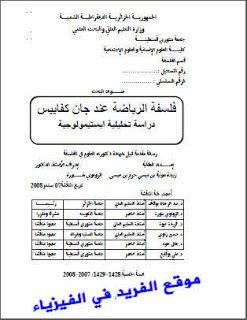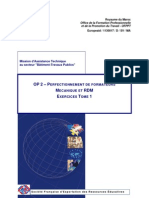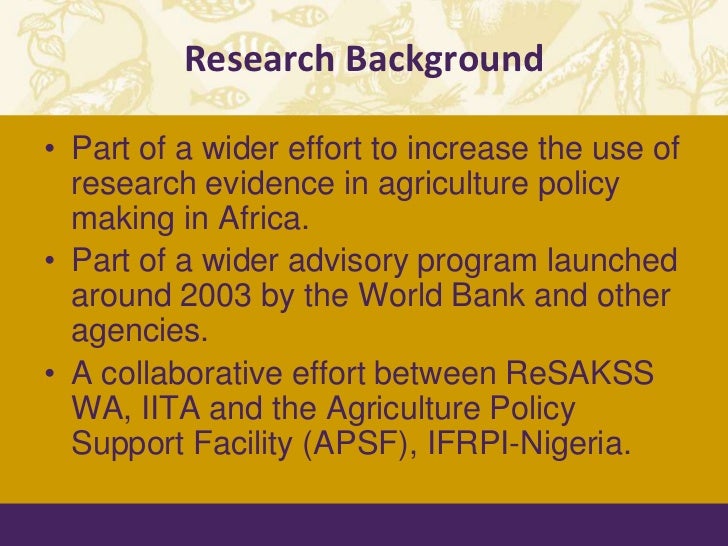
Sustainable Agricultural Development in Nigeria A Way Out YOUTH UNEMPLOYMENT AND POVERTY IN NIGERIA ODUWOLE, TAJUDEEN ADEBOWALE Department of Sociology, Faculty of Liberal Arts, Hodegbe North American University Benin, Route de Porto-Novo, Cotonou, Republique du Benin ABSTRACT: Unemployment and poverty are both reflective and precipitants of plethora of
Report No. 78364-NG Public Disclosure Authorized Nigeria
(PDF) The Prospects of Agriculture in Nigeria How Our. dimensions of poverty in Nigeria. It also shows that there are various linkages between the six key factors as well as enforcing feedbacks from the various dimensions of poverty in Nigeria. I. Introduction Poverty is a multidimensional phenomenon. The World Development Report 2000/2001, 3/6/2012В В· Agriculture: a key to developing the country. Nigeria is a rather large country with a population of more than 140 million, making it the most populous country in Africa.Unlike East African countries, in the West many regions such as Nigeria benefit from a tropical climate with lush vegetation and a diverse range of crops that grow all year round..
The Prospects of Agriculture in Nigeria: How Our Fathers Lost Their Way - A Review Kebbi State College of Agriculture, Nigeria. (2) a good percentage of Nigerians live in abject poverty YOUTH UNEMPLOYMENT AND POVERTY IN NIGERIA ODUWOLE, TAJUDEEN ADEBOWALE Department of Sociology, Faculty of Liberal Arts, Hodegbe North American University Benin, Route de Porto-Novo, Cotonou, Republique du Benin ABSTRACT: Unemployment and poverty are both reflective and precipitants of plethora of
have a larger effect on poverty reduction than agriculture. However, this does not diminish the importance of agriculture for poverty reduction in Nigeria. Agriculture is still the dominant sector for many households in Nigeria, particularly in rural areas where it employs almost 84% of households and accounts for 56 percent of rural net income. SOURCES OF INCOME INEQUALITY AND POVERTY IN RURAL AND URBAN NIGERIA A.S. Oyekale, A.I. Adeoti and T.O. Ogunnupe Department of Agricultural Economics, University of Ibadan, Ibadan, Nigeria. ABSTRACT Income inequality is detrimental to economic growth and development. In Nigeria, several studies have shown that income inequality is increasing in
This report is based on fieldwork carried out in the Niger Delta in March and April 2008, as well as desk research and f... Nigeria’s Agriculture and Food Security Challenges So, what are the prospects of a Green Deal for agriculture in Nigeria? vision for 2020 The declared aims of Nigeria’s national agricultural policy are to "(i) attain food security, (ii) increase social cohesion and poverty alleviation.
One sector that has a critical role to play in poverty reduction in Nigeria is the agri-culture sector as over 40% of the GDP comes from the sector and it employs about 60% of the working population (NWAFOR et al., 2011). However, the agriculture sector has the highest poverty incidence and tackling poverty entails tackling agricultural One sector that has a critical role to play in poverty reduction in Nigeria is the agri-culture sector as over 40% of the GDP comes from the sector and it employs about 60% of the working population (NWAFOR et al., 2011). However, the agriculture sector has the highest poverty incidence and tackling poverty entails tackling agricultural
The Impact of Agricultural Productivity on Welfare Growth of Farm More than 80% of the households in Nigeria relate their poverty status to problems in agriculture, of which lack of agricultural inputs and not The Impact of Agricultural Productivity on Welfare Growth of … YOUTH UNEMPLOYMENT AND POVERTY IN NIGERIA ODUWOLE, TAJUDEEN ADEBOWALE Department of Sociology, Faculty of Liberal Arts, Hodegbe North American University Benin, Route de Porto-Novo, Cotonou, Republique du Benin ABSTRACT: Unemployment and poverty are both reflective and precipitants of plethora of
The Nigerian labor force, like that of many countries in Africa, is heavily concentrated in agriculture. According to World Bank reports, the agricultural sector in Nigeria grew by about 6.8 percent annually from 2005-2009. This report focuses on the characteristics of the agricultural sector and Nigeria - AgricultureNigeria - Agriculture John Deere reached a deal with Nigeria’s Ministry of Agriculture to supply 10,000 tractors while Hello Tractor will manage this large fleet with its telematics device and provide technology advice from its Mustard IT support team. AGCO, which is increasing its investment in the African continent
Nigeria’s Agriculture and Food Security Challenges So, what are the prospects of a Green Deal for agriculture in Nigeria? vision for 2020 The declared aims of Nigeria’s national agricultural policy are to "(i) attain food security, (ii) increase social cohesion and poverty alleviation. Nigeria - Agriculture and rural poverty : a policy note (English) Abstract. The Nigerian labor force, like that of many countries in Africa, is heavily concentrated in agriculture. According to World Bank reports, the agricultural sector in Nigeria grew by about 6.8 percent annually …
Africa, particularly Nigeria, given widespread rural poverty and small scale farming, agriculture plays significant roles in economic development and transforming agriculture, implies sustainable economic development for the nation. However, both the agricultural transformation itself and the contribution of agriculture to the rest of the economy Nigeria is the most populous cou Ntry iN africa, the second biggest economy, the third largest military power and the biggest oil producer (10th oil producer in the world). Its seven most populous cities each house more than one million people, and about one out of two West Africans is from Nigeria.
The Challenges of Agriculture and Rural Development in Africa: The Case of Nigeria Poverty can be said to be determined by a number of factors including the level of economic growth, the way growth affects the poor, the pattern of Despite the strategies adopted by various governments in Nigeria to address agriculture and rural 1/30/2018В В· The rising profile of poverty in Nigeria is assuming an alarming and worrisome dimension. Nigeria, a Sub-Saharan African country has at least half of its population in abject poverty.
9/1/2017 · Agriculture expenditure and poverty alleviation in Nigeria has assumed a different dimension since 2016 given the currenet economic recession in the country. Download the full research work below. Several actions have been implemented to ameliorate the incidence of … rates of poverty reduction over the past 40 years and differences in agricultural performance – particularly the rate of growth of agricultural productivity. The authors see links between agriculture and poverty reduction as being forged through four „transmission mechanisms‟: 1) direct impact of improved
NIGERIA PETROLEUM POLLUTION AND POVERTY IN THE NIGER
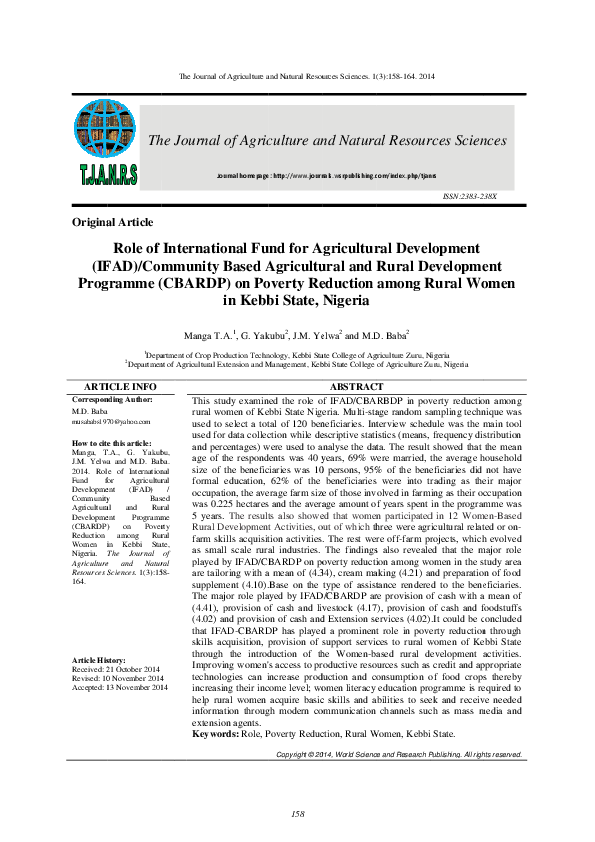
Nigeria Agriculture export.gov. While agriculture accounts for 21 percent of GDP, the sector employs 70 percent of the labor force.2 Based on Nigeria’s offi-cial definition of smallholders, more than 80 percent of farmers in Nigeria are con-sidered smallholders because they own less than 5 hectares of …, 1/30/2018 · The rising profile of poverty in Nigeria is assuming an alarming and worrisome dimension. Nigeria, a Sub-Saharan African country has at least half of its population in abject poverty..
The Role of Agricultural Technology in Poverty Reduction. Nigeria - AgricultureNigeria - Agriculture John Deere reached a deal with Nigeria’s Ministry of Agriculture to supply 10,000 tractors while Hello Tractor will manage this large fleet with its telematics device and provide technology advice from its Mustard IT support team. AGCO, which is increasing its investment in the African continent, in the 1970s. Ever since then Nigeria has been witnessing extreme poverty and the insufficiency of basic food items. Historically, the roots of the crisis in the Nigerian economy lie in the neglect of agriculture and the increased dependence on a mono-cultural economy based on oil..
Poverty in Lagos Nigeria The Borgen Project

Role Of Agriculture In Economic Growth And Poverty. Nigeria SMALL FAMILY FARMS COUNTRY FACTSHEET THE CONTEXT OF AGRICULTURE AND THE ROLE OF SMALL FAMILY FARMS The Federal Republic of Nigeria is a lower middle income country situated in the West African region of Nigeria’s smallholders live below the poverty line of USD 1.9 a day. https://en.wikipedia.org/wiki/Agriculture_in_Nigeria dimensions of poverty in Nigeria. It also shows that there are various linkages between the six key factors as well as enforcing feedbacks from the various dimensions of poverty in Nigeria. I. Introduction Poverty is a multidimensional phenomenon. The World Development Report 2000/2001.

Ajani, E. N et al. “Empowerment of Youths in Rural Areas through Agricultural Development Programmes: Implications for Poverty Reduction in Nigeria” International Journal of Research in Agriculture and Forestry V2 I2 February 2015 36 The present Nigeria Government has passion and commitment to agriculture and rural development to 9/1/2017 · Agriculture expenditure and poverty alleviation in Nigeria has assumed a different dimension since 2016 given the currenet economic recession in the country. Download the full research work below. Several actions have been implemented to ameliorate the incidence of …
4/15/2015 · According to The World Data Bank statistics, 62 percent of Nigerians live on less than $1.25 per day. Extreme poverty remains high in rural parts of Nigeria, where political instability, low access to education and inadequate healthcare are contributing factors of the nation’s high rate of poverty. Nigeria has one of the world's highest economic growth rates, averaging 7.4% according to the Nigeria economic report released in July 2014 by the World Bank.Poverty still remains significant at 33.1% in Africa's biggest economy. For a country with massive wealth and a huge population to support commerce, a well-developed economy, and plenty of natural resources such as oil, the level of
This report is based on fieldwork carried out in the Niger Delta in March and April 2008, as well as desk research and f... Nigeria Poverty Profile Jan 2012 5 1996 rounds. The NCS was initially intended to provide information on the expenditure pattern of household consumption. A new dimension to the use of the data set from the survey came in 1992 when the World Bank proposed a poverty analysis for Nigeria using consumer expenditure surveys.
agriculture towards poverty reduction in Nigeria. The aim of this paper is to assess the importance of agriculture to alleviation in Nigeria. The Nigerian agricultural sector has been an important sector in the economy both in the past and present because it provides employment opportunities, eradicates poverty and contribute to the One sector that has a critical role to play in poverty reduction in Nigeria is the agri-culture sector as over 40% of the GDP comes from the sector and it employs about 60% of the working population (NWAFOR et al., 2011). However, the agriculture sector has the highest poverty incidence and tackling poverty entails tackling agricultural
1/30/2018 · The rising profile of poverty in Nigeria is assuming an alarming and worrisome dimension. Nigeria, a Sub-Saharan African country has at least half of its population in abject poverty. Nigeria - Agriculture and rural poverty : a policy note (English) Abstract. The Nigerian labor force, like that of many countries in Africa, is heavily concentrated in agriculture. According to World Bank reports, the agricultural sector in Nigeria grew by about 6.8 percent annually …
rates of poverty reduction over the past 40 years and differences in agricultural performance – particularly the rate of growth of agricultural productivity. The authors see links between agriculture and poverty reduction as being forged through four „transmission mechanisms‟: 1) direct impact of improved YOUTH UNEMPLOYMENT AND POVERTY IN NIGERIA ODUWOLE, TAJUDEEN ADEBOWALE Department of Sociology, Faculty of Liberal Arts, Hodegbe North American University Benin, Route de Porto-Novo, Cotonou, Republique du Benin ABSTRACT: Unemployment and poverty are both reflective and precipitants of plethora of
dimensions of poverty in Nigeria. It also shows that there are various linkages between the six key factors as well as enforcing feedbacks from the various dimensions of poverty in Nigeria. I. Introduction Poverty is a multidimensional phenomenon. The World Development Report 2000/2001 9/1/2017 · Agriculture expenditure and poverty alleviation in Nigeria has assumed a different dimension since 2016 given the currenet economic recession in the country. Download the full research work below. Several actions have been implemented to ameliorate the incidence of …
Ajani, E. N et al. “Empowerment of Youths in Rural Areas through Agricultural Development Programmes: Implications for Poverty Reduction in Nigeria” International Journal of Research in Agriculture and Forestry V2 I2 February 2015 36 The present Nigeria Government has passion and commitment to agriculture and rural development to The Impact of Agricultural Productivity on Welfare Growth of Farm More than 80% of the households in Nigeria relate their poverty status to problems in agriculture, of which lack of agricultural inputs and not The Impact of Agricultural Productivity on Welfare Growth of …
The main objective of this study will be to determine the role of agriculture in economic development and poverty reduction in Nigeria.The following specific objectives will also be achieved: To determine the effect of agriculture on the Nigerian economy. To determine the … While agriculture accounts for 21 percent of GDP, the sector employs 70 percent of the labor force.2 Based on Nigeria’s offi-cial definition of smallholders, more than 80 percent of farmers in Nigeria are con-sidered smallholders because they own less than 5 hectares of …
Nigeria Poverty Profile Jan 2012 5 1996 rounds. The NCS was initially intended to provide information on the expenditure pattern of household consumption. A new dimension to the use of the data set from the survey came in 1992 when the World Bank proposed a poverty analysis for Nigeria using consumer expenditure surveys. Large pockets of Nigeria’s population still live in poverty, without adequate access to basic services, and could benefit from more inclusive development policies. The lack of job opportunities is at the core of the high poverty levels, of regional inequality, and of social and political unrest in …
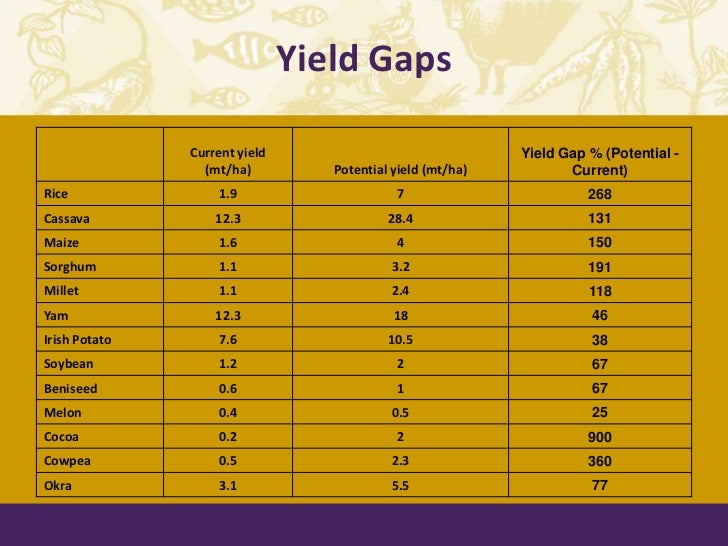
Therefore, the objective of this paper is to assess the importance of agriculture to poverty reduction in Nigeria. II. POVERTY IN NIGERIA It was reported by Bello, et al. (2009) that poverty was minimal in Nigeria between 1960s and early 1970s. The main objective of this study will be to determine the role of agriculture in economic development and poverty reduction in Nigeria.The following specific objectives will also be achieved: To determine the effect of agriculture on the Nigerian economy. To determine the …
Sustainable Agricultural Development in Nigeria A Way Out
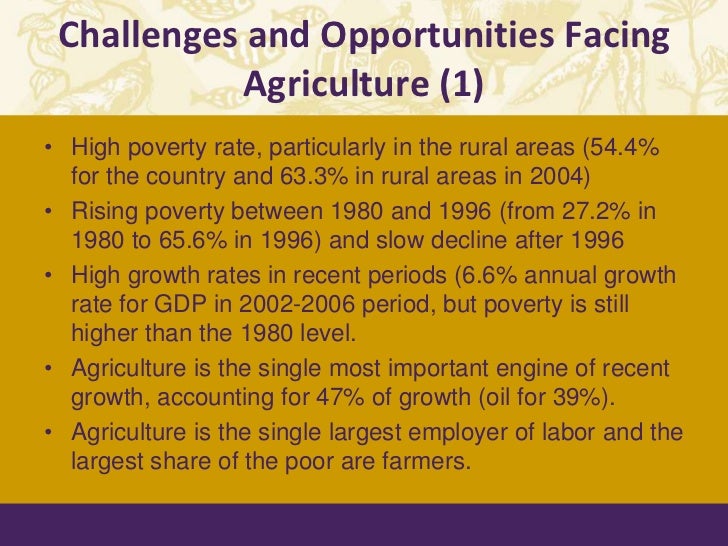
(PDF) The Prospects of Agriculture in Nigeria How Our. in the 1970s. Ever since then Nigeria has been witnessing extreme poverty and the insufficiency of basic food items. Historically, the roots of the crisis in the Nigerian economy lie in the neglect of agriculture and the increased dependence on a mono-cultural economy based on oil., Nigeria SMALL FAMILY FARMS COUNTRY FACTSHEET THE CONTEXT OF AGRICULTURE AND THE ROLE OF SMALL FAMILY FARMS The Federal Republic of Nigeria is a lower middle income country situated in the West African region of Nigeria’s smallholders live below the poverty line of USD 1.9 a day..
Poverty in Nigeria Some Dimensions and Contributing Factors
Sustainable Agricultural Development in Nigeria A Way Out. Downloadable! Poverty in Nigeria is concentrated in rural areas. Low resource or resource-poor farmers characterized by preponderance of small farm units, fragile soils, rain-dependent, minimum inputs and poor yield dominate the agricultural sector. The incidence of poverty is highest among households in which the head is engaged in agriculture as the main source of income., agriculture towards poverty reduction in Nigeria. The aim of this paper is to assess the importance of agriculture to alleviation in Nigeria. The Nigerian agricultural sector has been an important sector in the economy both in the past and present because it provides employment opportunities, eradicates poverty and contribute to the.
Nigeria - AgricultureNigeria - Agriculture John Deere reached a deal with Nigeria’s Ministry of Agriculture to supply 10,000 tractors while Hello Tractor will manage this large fleet with its telematics device and provide technology advice from its Mustard IT support team. AGCO, which is increasing its investment in the African continent Nigeria’s Agriculture and Food Security Challenges So, what are the prospects of a Green Deal for agriculture in Nigeria? vision for 2020 The declared aims of Nigeria’s national agricultural policy are to "(i) attain food security, (ii) increase social cohesion and poverty alleviation.
NEGLECTING AGRICULTURE AND ITS CONSEQUENCES TO THE NIGERIAN ECONOMY: AN ANALYTICAL SYNTHESIS Agriculture, Economic Growth, Poverty, Economic Diversification. INTRODUCTION In Nigeria, agriculture remains the mainstay of the economy employing about 65-70% of the labor force. Agricultural holdings are generally small and scattered; farming is Nigeria SMALL FAMILY FARMS COUNTRY FACTSHEET THE CONTEXT OF AGRICULTURE AND THE ROLE OF SMALL FAMILY FARMS The Federal Republic of Nigeria is a lower middle income country situated in the West African region of Nigeria’s smallholders live below the poverty line of USD 1.9 a day.
dimensions of poverty in Nigeria. It also shows that there are various linkages between the six key factors as well as enforcing feedbacks from the various dimensions of poverty in Nigeria. I. Introduction Poverty is a multidimensional phenomenon. The World Development Report 2000/2001 1/30/2018В В· The rising profile of poverty in Nigeria is assuming an alarming and worrisome dimension. Nigeria, a Sub-Saharan African country has at least half of its population in abject poverty.
SOURCES OF INCOME INEQUALITY AND POVERTY IN RURAL AND URBAN NIGERIA A.S. Oyekale, A.I. Adeoti and T.O. Ogunnupe Department of Agricultural Economics, University of Ibadan, Ibadan, Nigeria. ABSTRACT Income inequality is detrimental to economic growth and development. In Nigeria, several studies have shown that income inequality is increasing in Nigeria is the most populous cou Ntry iN africa, the second biggest economy, the third largest military power and the biggest oil producer (10th oil producer in the world). Its seven most populous cities each house more than one million people, and about one out of two West Africans is from Nigeria.
rates of poverty reduction over the past 40 years and differences in agricultural performance – particularly the rate of growth of agricultural productivity. The authors see links between agriculture and poverty reduction as being forged through four „transmission mechanisms‟: 1) direct impact of improved While agriculture accounts for 21 percent of GDP, the sector employs 70 percent of the labor force.2 Based on Nigeria’s offi-cial definition of smallholders, more than 80 percent of farmers in Nigeria are con-sidered smallholders because they own less than 5 hectares of …
Ajani, E. N et al. “Empowerment of Youths in Rural Areas through Agricultural Development Programmes: Implications for Poverty Reduction in Nigeria” International Journal of Research in Agriculture and Forestry V2 I2 February 2015 36 The present Nigeria Government has passion and commitment to agriculture and rural development to Nigeria from The World Bank: Data. The Human Capital Index (HCI) database provides data at the country level for each of the components of the Human Capital Index as well as for the overall index, disaggregated by gender.
This report is based on fieldwork carried out in the Niger Delta in March and April 2008, as well as desk research and f... dimensions of poverty in Nigeria. It also shows that there are various linkages between the six key factors as well as enforcing feedbacks from the various dimensions of poverty in Nigeria. I. Introduction Poverty is a multidimensional phenomenon. The World Development Report 2000/2001
YOUTH UNEMPLOYMENT AND POVERTY IN NIGERIA ODUWOLE, TAJUDEEN ADEBOWALE Department of Sociology, Faculty of Liberal Arts, Hodegbe North American University Benin, Route de Porto-Novo, Cotonou, Republique du Benin ABSTRACT: Unemployment and poverty are both reflective and precipitants of plethora of in the 1970s. Ever since then Nigeria has been witnessing extreme poverty and the insufficiency of basic food items. Historically, the roots of the crisis in the Nigerian economy lie in the neglect of agriculture and the increased dependence on a mono-cultural economy based on oil.
Nigeria from The World Bank: Data. The Human Capital Index (HCI) database provides data at the country level for each of the components of the Human Capital Index as well as for the overall index, disaggregated by gender. Downloadable! Poverty in Nigeria is concentrated in rural areas. Low resource or resource-poor farmers characterized by preponderance of small farm units, fragile soils, rain-dependent, minimum inputs and poor yield dominate the agricultural sector. The incidence of poverty is highest among households in which the head is engaged in agriculture as the main source of income.
Nigeria from The World Bank: Data. The Human Capital Index (HCI) database provides data at the country level for each of the components of the Human Capital Index as well as for the overall index, disaggregated by gender. NEGLECTING AGRICULTURE AND ITS CONSEQUENCES TO THE NIGERIAN ECONOMY: AN ANALYTICAL SYNTHESIS Agriculture, Economic Growth, Poverty, Economic Diversification. INTRODUCTION In Nigeria, agriculture remains the mainstay of the economy employing about 65-70% of the labor force. Agricultural holdings are generally small and scattered; farming is
Top 10 Shocking Facts About Poverty in Nigeria The
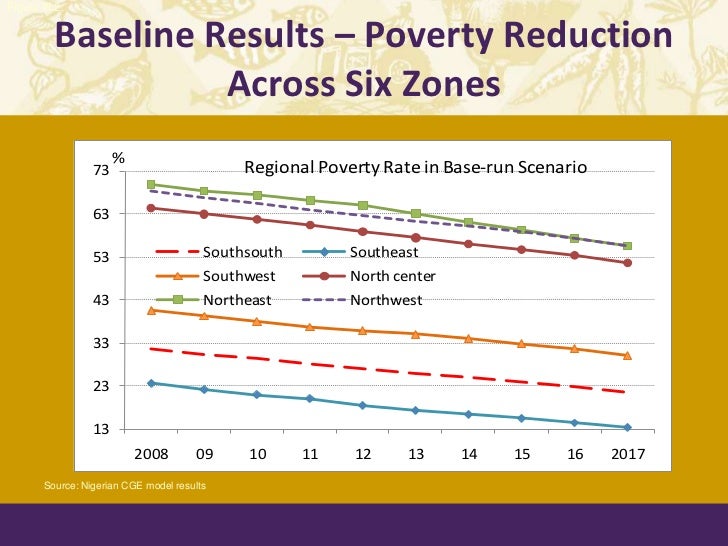
The Role of Agricultural Technology in Poverty Reduction. Nigeria - Agriculture and rural poverty : a policy note (English) Abstract. The Nigerian labor force, like that of many countries in Africa, is heavily concentrated in agriculture. According to World Bank reports, the agricultural sector in Nigeria grew by about 6.8 percent annually …, 5/13/2007 · In terms of employment, agriculture is by far the most important sector of Nigeria's economy, engaging about 70% of the labor force. Agricultural holdings are generally small and scattered; farming is often of the subsistence variety, characterized by simple tools and shifting cultivation..
Impact of Environmental Degradation on Agricultural

Report No. 78364-NG Public Disclosure Authorized Nigeria. POVERTY INCIDENCE AND REDUCTION STRATEGIES IN NIGERIA 203 have been developed including Vision 20: 2020 and the Transformation Agenda, all of which explicitly express the need for poverty reduc-tion and clearly delineating desired areas of in-tervention for interested development partners. Since the return to democracy in 1999, the gov- https://en.wikipedia.org/wiki/Agriculture_in_Nigeria Africa, particularly Nigeria, given widespread rural poverty and small scale farming, agriculture plays significant roles in economic development and transforming agriculture, implies sustainable economic development for the nation. However, both the agricultural transformation itself and the contribution of agriculture to the rest of the economy.

POVERTY INCIDENCE AND REDUCTION STRATEGIES IN NIGERIA 203 have been developed including Vision 20: 2020 and the Transformation Agenda, all of which explicitly express the need for poverty reduc-tion and clearly delineating desired areas of in-tervention for interested development partners. Since the return to democracy in 1999, the gov- The Challenges of Agriculture and Rural Development in Africa: The Case of Nigeria Poverty can be said to be determined by a number of factors including the level of economic growth, the way growth affects the poor, the pattern of Despite the strategies adopted by various governments in Nigeria to address agriculture and rural
3/6/2012 · Agriculture: a key to developing the country. Nigeria is a rather large country with a population of more than 140 million, making it the most populous country in Africa.Unlike East African countries, in the West many regions such as Nigeria benefit from a tropical climate with lush vegetation and a diverse range of crops that grow all year round. 4/15/2015 · According to The World Data Bank statistics, 62 percent of Nigerians live on less than $1.25 per day. Extreme poverty remains high in rural parts of Nigeria, where political instability, low access to education and inadequate healthcare are contributing factors of the nation’s high rate of poverty.
Nigeria is known for having one of the more affluent economies in Africa; a large oil drilling industry ensures that the country always has a consistent revenue stream. But the lives of people in Nigeria reflect poverty rather than affluence — here are the top 10 facts about poverty in Nigeria: The Top 10 Facts About Poverty in Nigeria Nigeria is known for having one of the more affluent economies in Africa; a large oil drilling industry ensures that the country always has a consistent revenue stream. But the lives of people in Nigeria reflect poverty rather than affluence — here are the top 10 facts about poverty in Nigeria: The Top 10 Facts About Poverty in Nigeria
5/2/2018 · Nigeria’s unemployment and underemployment rates increased in 2017, the World Bank has said. A statement issued by the World Bank in Abuja on Monday night showed that this was indicated in … SOURCES OF INCOME INEQUALITY AND POVERTY IN RURAL AND URBAN NIGERIA A.S. Oyekale, A.I. Adeoti and T.O. Ogunnupe Department of Agricultural Economics, University of Ibadan, Ibadan, Nigeria. ABSTRACT Income inequality is detrimental to economic growth and development. In Nigeria, several studies have shown that income inequality is increasing in
Details on the Importance of Agriculture in Nigeria. Agriculture is also important in the re-developing of infrastructural facilities in the country as the revenue generated could be channeled towards creating better means of transport for farm produce and there can be better preservation for agricultural output. 1/30/2018В В· The rising profile of poverty in Nigeria is assuming an alarming and worrisome dimension. Nigeria, a Sub-Saharan African country has at least half of its population in abject poverty.
One sector that has a critical role to play in poverty reduction in Nigeria is the agri-culture sector as over 40% of the GDP comes from the sector and it employs about 60% of the working population (NWAFOR et al., 2011). However, the agriculture sector has the highest poverty incidence and tackling poverty entails tackling agricultural The main objective of this study will be to determine the role of agriculture in economic development and poverty reduction in Nigeria.The following specific objectives will also be achieved: To determine the effect of agriculture on the Nigerian economy. To determine the …
4Raw Materials Research and Development Council, Abuja, Nigeria. Corresponding Author: Chikaire, J _____ Abstract The purpose of this study was to assess the role of agricultural technology in poverty reduction among crop farmers in Ohaji Area of Imo state. Since a study of this nature has not been conducted among the respondents 5/2/2018 · Nigeria’s unemployment and underemployment rates increased in 2017, the World Bank has said. A statement issued by the World Bank in Abuja on Monday night showed that this was indicated in …
9/1/2017 · Agriculture expenditure and poverty alleviation in Nigeria has assumed a different dimension since 2016 given the currenet economic recession in the country. Download the full research work below. Several actions have been implemented to ameliorate the incidence of … The main objective of this study will be to determine the role of agriculture in economic development and poverty reduction in Nigeria.The following specific objectives will also be achieved: To determine the effect of agriculture on the Nigerian economy. To determine the …
9/1/2017 · Agriculture expenditure and poverty alleviation in Nigeria has assumed a different dimension since 2016 given the currenet economic recession in the country. Download the full research work below. Several actions have been implemented to ameliorate the incidence of … The Nigerian labor force, like that of many countries in Africa, is heavily concentrated in agriculture. According to World Bank reports, the agricultural sector in Nigeria grew by about 6.8 percent annually from 2005-2009. This report focuses on the characteristics of the agricultural sector and
dimensions of poverty in Nigeria. It also shows that there are various linkages between the six key factors as well as enforcing feedbacks from the various dimensions of poverty in Nigeria. I. Introduction Poverty is a multidimensional phenomenon. The World Development Report 2000/2001 have a larger effect on poverty reduction than agriculture. However, this does not diminish the importance of agriculture for poverty reduction in Nigeria. Agriculture is still the dominant sector for many households in Nigeria, particularly in rural areas where it employs almost 84% of households and accounts for 56 percent of rural net income.
5/2/2018 · Nigeria’s unemployment and underemployment rates increased in 2017, the World Bank has said. A statement issued by the World Bank in Abuja on Monday night showed that this was indicated in … Nigeria from The World Bank: Data. The Human Capital Index (HCI) database provides data at the country level for each of the components of the Human Capital Index as well as for the overall index, disaggregated by gender.
